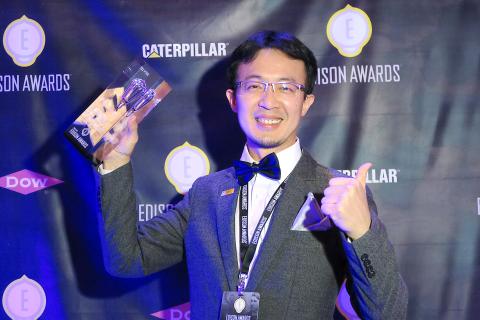The Industrial Technology Research Institute (ITRI) on Wednesday won a silver medal in the Edison Awards Commercial Safety category for its Fluid-Driven Emergency Rescuer, which helps firefighters work more effectively and safely.
The invention, a small box that contains a micro-turbine generator, can be mounted on a fire hose nozzle and generate thermal imaging, light and signals that point to evacuation routes using hydropower, according to descriptions on the ITRI and Edison Awards’ Web sites.
Evin Liao (廖榮皇), the inventor of the technology who accepted the award on behalf of the ITRI team, said he is honored to be able to take a Taiwan-made innovation to the global stage.

Photo: CNA
Recognition should go to the entire ITRI team and the people of Taiwan because the ITRI believes that only through continuous innovation will the lives of Taiwanese and the rest of the world become better and safer, Liao said.
Fluid-Driven Emergency Rescuer technology can also be used for sprinklers in buildings, so that when they are activated, green lights show a path to emergency exits.
Edison Awards executive director Frank Bonafili said that the technology’s practical nature is what makes him confident that there are plenty of commercial possibilities for it.
If the technology can be implemented in buildings and schools, it would not only make people feel more secure, but would also attract the interest of developers and real-estate insurers, Bonafilia said.
The New York City Fire Department has expressed an interest in learning about the technology.
It marks the second consecutive year that the ITRI has won a silver medal at the Edison Awards.
Last year, the institute won a silver in the Power Source subsection of the Energy and Sustainability category for the URABat, an ultrafast rechargeable aluminum battery.
The Edison Awards, now in its 31st year, was founded in memory of scientist Thomas Edison to honor “excellence in new product and service development, marketing, human-centered design and innovation,” its Web site says.

The manufacture of the remaining 28 M1A2T Abrams tanks Taiwan purchased from the US has recently been completed, and they are expected to be delivered within the next one to two months, a source said yesterday. The Ministry of National Defense is arranging cargo ships to transport the tanks to Taiwan as soon as possible, said the source, who is familiar with the matter. The estimated arrival time ranges from late this month to early next month, the source said. The 28 Abrams tanks make up the third and final batch of a total of 108 tanks, valued at about NT$40.5 billion

Travel agencies in Taiwan are working to secure alternative flights for travelers bound for New Zealand for the Lunar New Year holiday, as Air New Zealand workers are set to strike next week. The airline said that it has confirmed that the planned industrial action by its international wide-body cabin crew would go ahead on Thursday and Friday next week. While the Auckland-based carrier pledged to take reasonable measures to mitigate the impact of the workers’ strike, an Air New Zealand flight arriving at Taipei from Auckland on Thursday and another flight departing from Taipei for Auckland on Saturday would have to

A group from the Taiwanese Designers in Australia association yesterday represented Taiwan at the Midsumma Pride March in Melbourne. The march, held in the St. Kilda suburb, is the city’s largest LGBTQIA+ parade and the flagship event of the annual Midsumma Festival. It attracted more than 45,000 spectators who supported the 400 groups and 10,000 marchers that participated this year, the association said. Taiwanese Designers said they organized a team to march for Taiwan this year, joining politicians, government agencies, professionals and community organizations in showing support for LGBTQIA+ people and diverse communities. As the first country in Asia to legalize same-sex

MOTIVES QUESTIONED The PLA considers Xi’s policies toward Taiwan to be driven by personal considerations rather than military assessment, the Epoch Times reports Chinese President Xi Jinping’s (習近平) latest purge of the Chinese People’s Liberation Army (PLA) leadership might have been prompted by the military’s opposition to plans of invading Taiwan, the Epoch Times said. The Chinese military opposes waging war against Taiwan by a large consensus, putting it at odds with Xi’s vision, the Falun Gong-affiliated daily said in a report on Thursday, citing anonymous sources with insight into the PLA’s inner workings. The opposition is not the opinion of a few generals, but a widely shared view among the PLA cadre, the Epoch Times cited them as saying. “Chinese forces know full well that